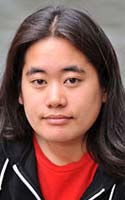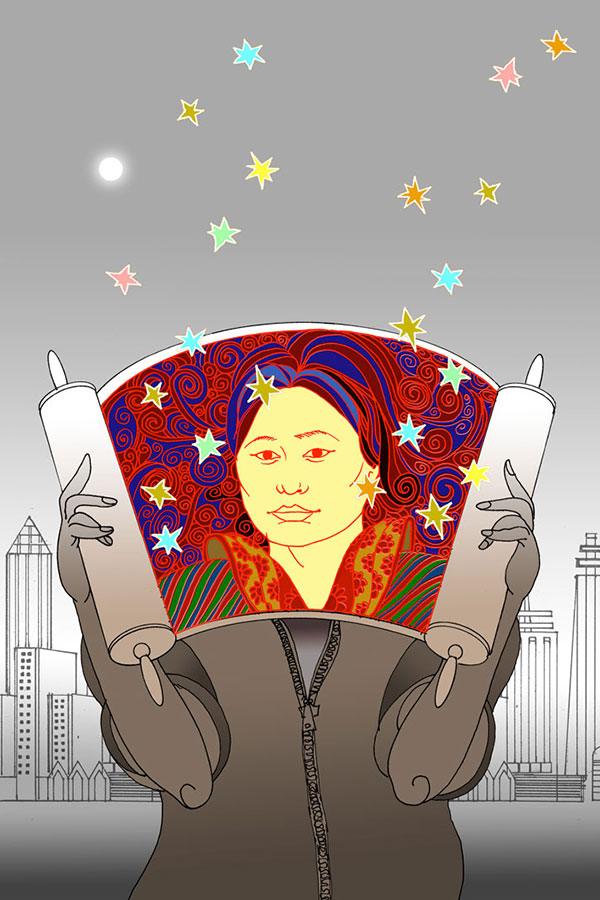“My work today is dedicated to supporting voices from inside Tibet and the Chinese People’s Republic,” she said at the 2011 Geneva Summit on Human Rights and Democracy.
“Tibetans are fully capable of speaking for themselves, and their voices are often eloquent [and] extremely courageous. It’s important for those voices to be heard, represented, and amplified.”
Pemba is the founder and editor of the website “High Peaks Pure Earth,” where English translations of poems, songs, and other writings by Tibetans living inside Tibet and the People’s Republic of China can be found.
It has now become a major platform for Tibetan blogger Woeser and other writers and artists who use it to collaborate creatively across borders and beyond the reach of censors.

Dechen Pemba
Pemba founded the website with her uncle, the historian Tsering Shakya, in 2008—the year that Beijing hosted the Summer Olympics, and the same year that major protests broke out against Chinese rule in Tibet.
It was also the year that Pemba was expelled from China, accused of “illegal activities.”
Two weeks before the Games opened, she was put on a plane by unidentified men and told that she was subject to a five-year ban on entering the country. Though that ban has now technically expired, she has not tested it since.
The uprising in Tibet was brutally suppressed by Chinese security forces, and Pemba returned to London to begin work on a Master’s degree in Chinese studies at the School of Oriental and African studies.
2008 was also the year in which a daring documentary, “Leaving Fear Behind,” was produced, for which the filmmakers Dhondup Wangchen and Golog Jigme Gyatso were thrown into jail and tortured.
The film interviews ordinary Tibetans on their views of life under Chinese rule.
While in China, Pemba had met with Wangchen before his arrest and was able to record an interview about his motivation for making the film. She was also part of a network of friends who were able to secure the film’s footage and smuggle it out of China in batches, and took part in its post-production.
The documentary premiered two days before the start of the Olympic Games, and was clandestinely screened for foreign reporters in Beijing.
Gyatso escaped from jail in 2014, and Wangchen was released in June that same year but remains unable to leave China to join his wife and children in political asylum in the United States.
In a 2009 interview with Human Rights in China, Pemba quoted one of the many Tibetans who had spoken openly to the camera:
“One of my favorite quotes from the footage didn’t make it into the 25-minute version. It is from a Tibetan nomad who feels Tibetans in China are like stars on a sunny day—they can’t be seen.”
Pemba’s website now shines a light on those stars for the world to see, taking advantage of electronic media and dealing with issues like censorship with humor and eloquent writing.
“Tibetans are fully capable of speaking for themselves, and their voices are often eloquent [and] extremely courageous.”
Dechen Pemba, who speaks with a soft British accent, is a graduate of University College in London with a BA in English and German Language and Literature. Upon graduation, she moved to Berlin in 2001 to open an office for the advocacy group International Campaign for Tibet.
In 2006, she moved to Beijing to study Chinese at the Central University for Nationalities, where her thesis focused on Chinese perceptions of Tibetan culture and where she became more and more aware of the adverse consequences of the Chinese policy of forced integration.
She was also able to travel several times to Tibet and got to know prominent Tibetans living in Beijing, including the writer and poet Woeser.
Although Pemba had spoken Tibetan at home since her childhood, nothing in her early life had pointed to her eventual involvement in controversy.
But as China’s fist began to close more and more tightly around Tibetan traditions and values, she found her calling in a persistent activism in defense of Tibetan voices.


 “It's Not OK: Women struggling for human rights” is a series of portraits of Asian women caught in the struggle for human rights in their communities. It was produced by Radio Free Asia. Download the
“It's Not OK: Women struggling for human rights” is a series of portraits of Asian women caught in the struggle for human rights in their communities. It was produced by Radio Free Asia. Download the